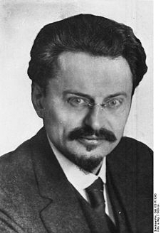
.
Trotsky was initially a supporter of the Menshevik Internationalists faction of the Russian Social Democratic Labour Party
. He joined the Bolsheviks immediately prior to the 1917 October Revolution
, and eventually became a leader within the Party. During the early days of the Soviet Union, he served first as People's Commissar for Foreign Affairs and later as the founder and commander of the Red Army as People's Commissar of Military and Naval Affairs.
As long as I breathe I hope. As long as I breathe I shall fight for the future, that radiant future, in which man, strong and beautiful, will become master of the drifting stream of his history and will direct it towards the boundless horizons of beauty, joy and happiness! ![]()
Learning carries within itself certain dangers because out of necessity one has to learn from one's enemies.![]()
The struggle against war, properly understood and executed, presupposes the uncompromising hostility of the proletariat and its organizations, always and everywhere, toward its own and every other imperialist bourgeoisie...![]()
The struggle against war and its social source, capitalism, presupposes direct, active, unequivocal support to the oppressed colonial peoples in their struggles and wars against imperialism. A 'neutral' position is tantamount to support of imperialism.![]()
A sledgehammer breaks glass but forges steel.![]()
As for us, we were never concerned with the Kantian-priestly and vegetarian-Quaker prattle about the "sacredness of human life."![]()
The road to socialism lies through a period of the highest possible intensification of the principle of the state … Just as a lamp, before going out, shoots up in a brilliant flame, so the state, before disappearing, assumes the form of the dictatorship of the proletariat, i.e., the most ruthless form of state, which embraces the life of the citizens authoritatively in every direction...![]()
In inner-party politics, these methods lead, as we shall yet see, to this: the party organization substitutes itself for the party, the central committee substitutes itself for the organization, and, finally, a "dictator" substitutes himself for the central committee.![]()

